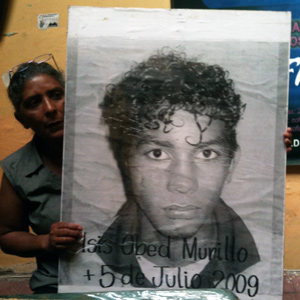At a Glance
Date Filed:
Current Status
Our Team:
- Pamela Spees
Client(s)
Case Description
CCR has been involved in advocacy aimed to address systemic human rights violations in Honduras arising out of the June 28, 2009, military coup that ousted President Manuel Zelaya. We have advocated against the U.S. government's current policy towards Honduras, particularly its continuing assistance and support to Honduran police and military forces whose involvement in the commission of serious human rights violations since the coup has been well-documented.
 On June 23, 2011, CCR filed a complaint in the Houston Division of the Southern District of Texas, on behalf of David Murillo and Silvia Mencías, the Isis Obed Murillo, who was a teenager when he was shot and killed on July 5, 2009, by Honduran military forces during a peaceful demonstration against the coup. Subsequent to Isis’ killing, his family was also subjected to surveillance and harassment by police and other authorities. The defendant is Roberto Micheletti Baín, former president of the Honduran National Congress who assumed the role of head of the de facto government immediately following the coup ousting President Zelaya. The complaint details extrajudicial killing, crimes against humanity of murder and persecution, wrongful death, and other gross human rights violations that occurred in Honduras under the authority and/or direction of Micheletti.
On June 23, 2011, CCR filed a complaint in the Houston Division of the Southern District of Texas, on behalf of David Murillo and Silvia Mencías, the Isis Obed Murillo, who was a teenager when he was shot and killed on July 5, 2009, by Honduran military forces during a peaceful demonstration against the coup. Subsequent to Isis’ killing, his family was also subjected to surveillance and harassment by police and other authorities. The defendant is Roberto Micheletti Baín, former president of the Honduran National Congress who assumed the role of head of the de facto government immediately following the coup ousting President Zelaya. The complaint details extrajudicial killing, crimes against humanity of murder and persecution, wrongful death, and other gross human rights violations that occurred in Honduras under the authority and/or direction of Micheletti.
On November 3, 2011, CCR filed its opposition to Micheletti's motion to dismiss the case. Along with the brief, CCR provided extensive documentation illustrating the culture of impunity that blocked justice for crimes committed under the Micheletti regime and permitted attacks to continue under the subsesquent government of Porfirio Lobo. An expert report submitted by a Human Rights Watch researcher affirmed that no one had been held criminally liable for the scores of politically motivated killings and other human rights violations that took place under Micheletti and also that little to no progress had been made in investigating the violence perpetrated under Lobo since he assumed the role of President in January 2010 -- after an election that was widely criticized as illegitimate.
Furthermore, in a statement included in Micheletti’s motion to dismiss, the office of the Prosecutor of Honduras asserted that Honduras did not hold Micheletti responsible for Murillo’s death -- despite the lack of a full, credible investigation. Yet, even the Honduran Truth and Reconciliation Commission (CVR), the independence and impartiality of which has been questioned by experts and advocates, found that Micheletti bore responsibility for the killing of Isis and others. In particular, the CVR found that Micheletti wielded command responsibility and implemented policies and practices that were the driving force behind the excessive use of force by the military and resulting human rights violations.
In addition, the filings also made public for the first time a September 11, 2009, U.S. Embassy letter, included in an attachment to Micheletti’s motion to dismiss, which states that his visa was revoked due to “the continued resistance of the de facto government to accept the San Jose Agreement and the continuous failure to restore the democratic and constitutional government of Honduras.”
The Honduran government’s explicit refusal to hold Micheletti accountable for Murillo’s death – effectively clearing his name without any genuine investigation – underscored the importance of the lawsuit and seeking recourse outside Honduras. Although the federal case is closed, CCR submitted documents obtained in the course of litigating the case to the International Criminal Court (ICC) in The Hague. In November 2012, in conjunction with the International Federation for Human Rights (FIDH), CCR submitted evidence to the ICC demonstrating the continued lack of accountability for the wave of grave human rights abuses in Honduras since the 2009 coup. Isis was the first victim in what became a systematic and widespread attack on dissent; since the coup, hundreds of people, including journalists, trade unionists, campesino activists, coup opposition leaders, and human rights defenders have been killed or disappeared. Highlighting Isis' case, the submission testifies to the impunity enjoyed by Micheletti and others in their home country and urges the Office of the Prosecutor at the ICC, considered a court of last resort, to open an investigation into the crimes under its jurisdiction.

